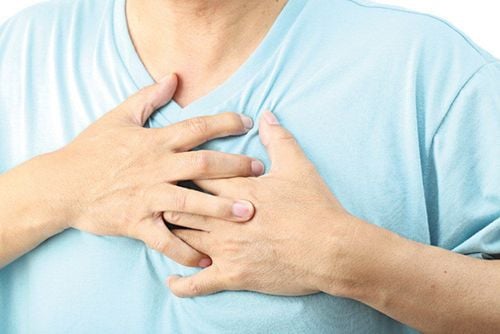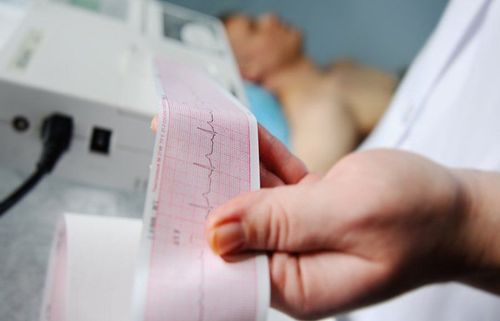Article by Mai Vien Phuong, Msc, MD - Gastrointestinal Endoscopy Doctor - Department of Outpatient and Internal Medicine - Vinmec Central Park International General Hospital
Chest pain can be described as squeezing or crushing, as well as a burning sensation. There are many types of chest pain and various causes, some of which are not considered serious. However, chest pain can also be a symptom of a heart attack. What causes chest pain and vomiting?
1. Learn about vomiting and nausea
Vomiting is the forceful expulsion of the contents of the stomach through the mouth. Nausea or abdominal pain often occurs before a person vomits. Here is what you need to know about experiencing these two symptoms together.
1.1 What causes chest pain and vomiting?
Here are the possible causes of chest pain and vomiting:
Heart-related conditions:
- Heartache
- Angina
- Ischemic cardiomyopathy
- Hypertensive heart disease
Causes related to the stomach and digestion:
- Acid reflux or GERD
- Peptic ulcer
- Gastritis
- Gallstones
- Intermittent hernia
Related to mental health:
- Panic disorder
- Concern
- Agoraphobia

Other causes:
- Hernia
- Malignant hypertension (hypertensive emergency)
- Delirium tremens (DT)
- Carbon monoxide poisoning
- Anthrax
1.2 When should you seek medical help?
Seek medical help immediately if you think a heart attack is causing chest pain and vomiting. Call 911 or your local emergency services if you experience those symptoms along with:
- Out of breath
- Sweating
- Dizziness
- Discomfort in the chest accompanied by pain radiating to the jaw
- Discomfort in the chest radiates to one arm or shoulder.
See a doctor within two days if your vomiting does not improve or worsen. You should also see a doctor immediately if you vomit blood, especially if accompanied by dizziness or changes in breathing.
2. Is sternum pain a heart attack?
Pain in the sternum can sometimes be the result of a heart attack. This is less likely to happen if you are under 40 years old or in good overall health. A heart attack will occur if you are over 40 years old and have a pre-existing condition, such as heart disease.
A heart attack will threaten your life. Therefore, you should go to the emergency room immediately if you have any symptoms other than chest pain, especially if these symptoms appear without a clear cause or if you have had a heart attack before.

2.1 Symptoms of a heart attack
The most typical symptoms of a heart attack include:
- Chest pain in the middle or left side of the chest
- Pain or discomfort in the upper body, including the arms, shoulders, and jaw
- Feeling dizzy or lightheaded
- Shortness of breath
- Sweating
- Nauseous
The more of these symptoms you have, the more likely you are having a heart attack.
2.2 When should you see a doctor?
See a doctor immediately if you have heart attack symptoms or symptoms that cause you severe pain, continuously disrupting your daily life.
You should also see a doctor if you have any of the following symptoms:
- Pain in the sternum and chest pain in general without a clear cause
- Sweating, dizziness, or nausea without a specific cause
- The pain spreads from the chest throughout the upper part of the body.
- Chest tightness
If you are experiencing other symptoms and they last more than a few days, talk to your doctor.
3. How to diagnose chest pain and vomiting?
If you have chest pain and vomiting, the doctor will start a physical examination, review your medical history and ask you about any additional symptoms you may be experiencing.
Tests that can be used to determine the diagnosis include chest X-rays and electrocardiograms (ECG or EKG).

4. How to treat chest pain and vomiting?
Treatment will depend on the cause of the symptoms. For example, if you are diagnosed with a heart attack, you may need immediate intervention to reopen the blocked blood vessels or open-heart surgery to reroute the blood flow.
The doctor can prescribe medication to stop vomiting and nausea, such as ondansetron (Zofran) and promethazine. Antacids or medications to reduce acid production in the stomach can treat the symptoms of acid reflux.
The doctor can also prescribe anti-anxiety medication if your symptoms are related to anxiety such as panic disorder or fear of memory loss.
5. How to care for chest pain and vomiting at home?
You can lose a significant amount of fluid when vomiting, so sip small amounts of clear fluids to avoid dehydration. Or you can also check out some tips to prevent nausea and vomiting.
Resting can also help reduce chest pain. If it is related to anxiety, deep breathing and preparing coping mechanisms can be helpful. These remedies can also be helpful if the situation is not an emergency. However, you should check with a doctor before treating chest pain at home. They can help you determine whether you need emergency care or not.
Usually, you cannot prevent chest pain and vomiting, but you can reduce the risk of certain diseases that may cause these symptoms. For example, eating a low-fat diet can reduce the risk of symptoms related to gallstones. Practicing healthy habits, such as exercising and avoiding smoking or passive smoke, can reduce the risk of heart attack.
6. What other musculoskeletal disorders can cause chest pain?
Disorders or injuries to the muscles and bones around the sternum can also cause sternum pain. This includes:
- Joint injury
- Clavicle fracture (collarbone)
- Broken bone
- Hernia
- Surgery on the sternum (such as open-heart surgery)

These are not the only musculoskeletal conditions that can cause damage to your sternum, but they are among the most common.
When the patient experiences chest pain, vomiting, and many other symptoms, they should see a doctor for examination and specific advice, because this could be a dangerous warning of abnormal health issues.
To provide the most accurate assessments of chest pain and vomiting, Vinmec International General Hospital has currently combined the Gastroenterology and Cardiology departments in examinations to offer the most precise diagnoses for patients.
With the convergence of a team of highly experienced experts, who have a great reputation in the fields of surgical and internal medicine, and the application of advanced techniques, along with a system of modern equipment for treatment, the hospital has now achieved significant success and gained the trust of a large number of patients nationwide.
To arrange an appointment, please call HOTLINE or make your reservation directly HERE. You may also download the MyVinmec app to schedule appointments faster and manage your reservations more conveniently.
To arrange an appointment, please call HOTLINE or make your reservation directly HERE. You may also download the MyVinmec app to schedule appointments faster and manage your reservations more conveniently.








